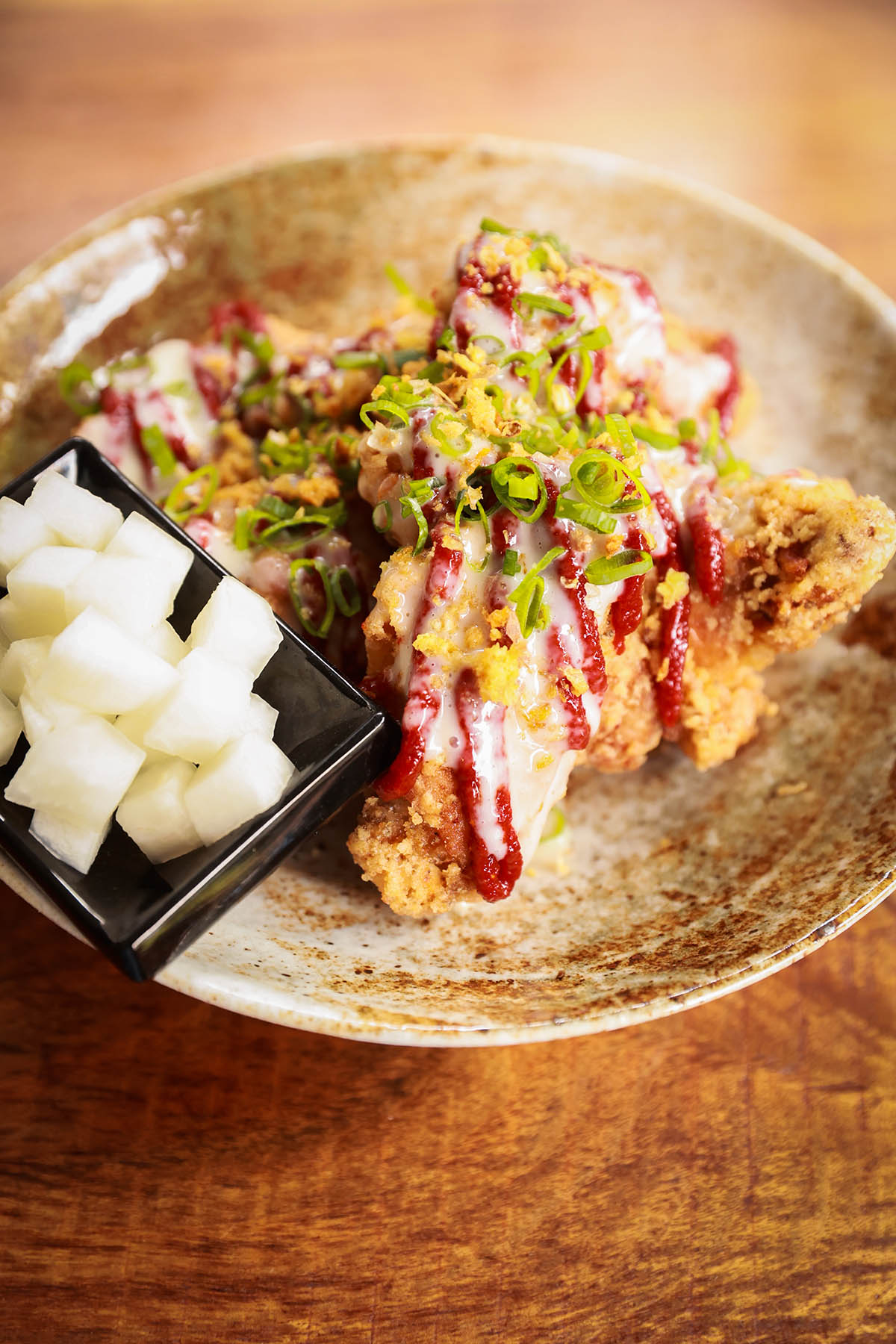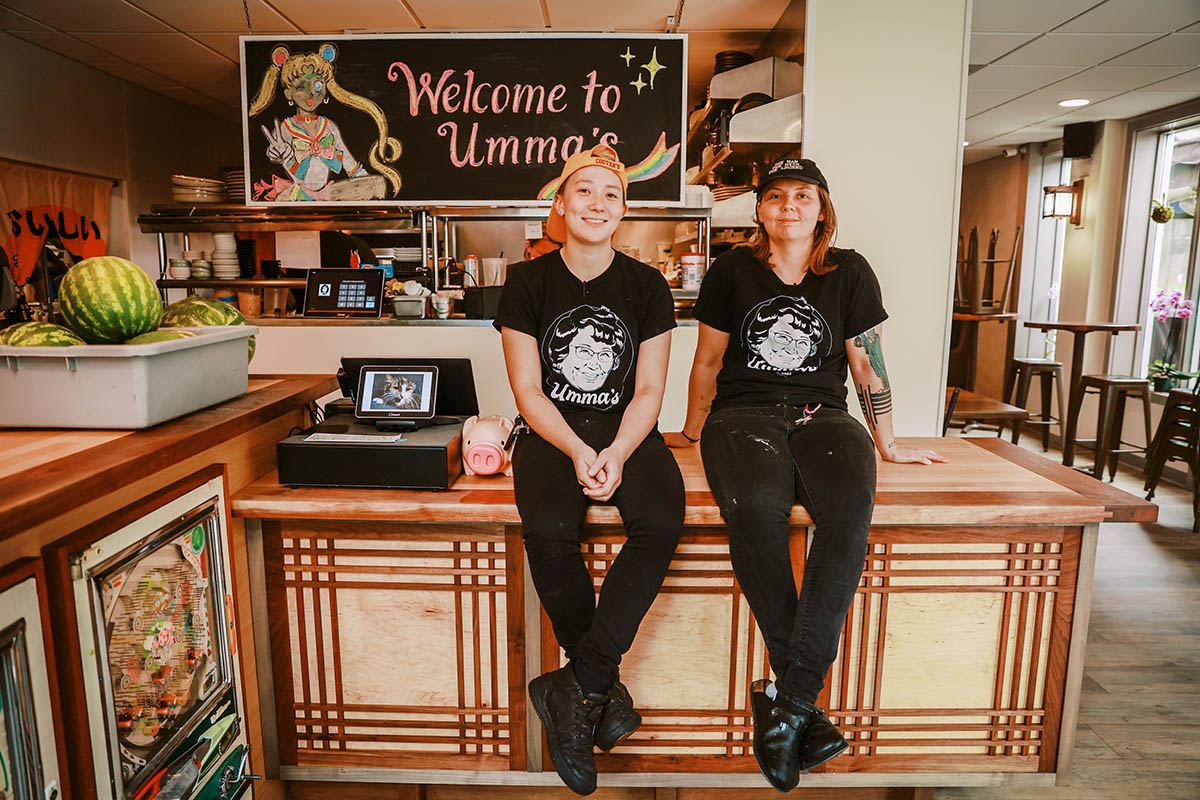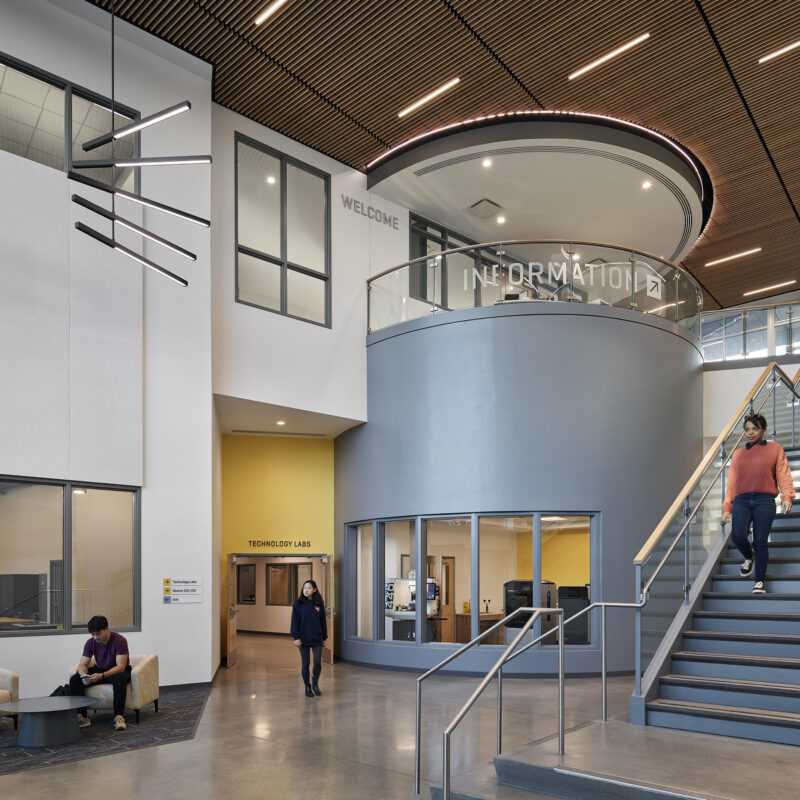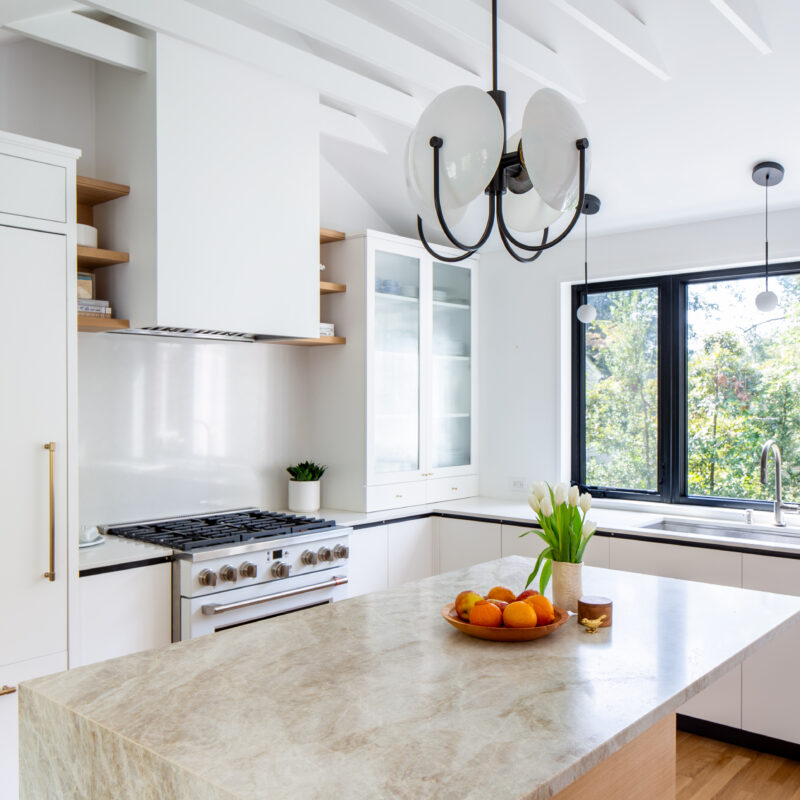Anna Gardner and Kelsey Naylor had been working in Charlottesville kitchens for years—Naylor at L’étoile, TEN, The Alley Light, Gardner at The Ivy Inn, Junction, Oakhurst Inn, and together at Public Fish & Oyster—when they started feeling a burn-out coming on. They decided to take a year off to explore Japan and, when they came back, they opened Pye Dog Pizza as a way to see what the classic Italian dish looks like outside of Italy—Naylor’s native Korea included (see: bulgogi and cheese pizza).
In 2020, wanting to focus even more on the Japanese cuisine they’d learned about during their year abroad, they pivoted to a new food truck concept: Basan, which is closer to Umma’s, the brick and mortar spot they opened this spring. It’s there that they’re exploring the intersection of Japan, Korea, and America and, even more specifically, Japan, Korea, and Charlottesville, utilizing a lot of ingredients from Sussex Farm, run by Naylor’s “mamabird,” Jen.
It’s that spirit that captured the attention of Splendora’s owner Patricia Ross, who’s been a fan of the women since Pye Dog and an even bigger one these days, as Umma’s continues to push the imagination and taste buds of local diners. Similarly, Ross works to create gelato and pastries that feel, as she says, “of a place.” Her gelato might not look quite like the cone you ordered that one time in Italy proper, but that’s because what Ross serves at her Stonefield shop is from her own perspective, and uses ingredients from Virginia—and the same goes for “authentic” Japanese cuisine at Umma’s.
“I hate that word,” Ross says. “I think authentic just means that it means something to someone. It sounds so Pollyanna, but I want people who live to make food to be able to confidently put their heart on a plate without worrying about a cognoscenti imposing judgment or a broader public dragging them to mediocrity.”
We asked the three women to chat—Actors on Actors-style—about authenticity, cooking across cultures, and the Charlottesville food scene. Oh, and which “whiny average dude ballad” they hate the most.
Patricia Ross: You guys have a point of view with your food that shares Korean history. Do you feel like your restaurant occupies a liminal space where you have roots in one place, but you’ve grafted onto your particular experience?
Kelsey Naylor: Definitely. I grew up eating the—my mom’s very anal, like, “This is how [the dish] is supposed to be.” And my grandmother’s like, “This is how it’s supposed to be.” And then when we went to Japan and saw the baselines of where that all came from. Our own experiences and Anna’s interpretations of things that I grew up with—putting a new spin on it. The way it’s evolved, I think, is kind of what the restaurant is turning into. Like generations of what it was into what it can be. Just using the idea and running with it.

PR: Do you think it surprises a lot of people—before the Apple TV series [“Pachinko”] came out—that Korea was colonized by Japan and that’s why there’s more of that kind of interplay between the foods? I feel like the Japanese overlay of what Korea’s existing food ways were is really interesting. Is that something you noticed when you lived in Japan?
KN: There are so many things where Korea took it and ran with it and made it, to our mind, better. But there are also certain things like curry that they took and just ruined (in my opinion). Like, why do you need to put raisins in? Not everything has to be spicy with raisins in it. Like, it’s gonna be okay.
PR: That translation really figures into the way you guys are doing your dishes now. Is that a deliberate choice that you made or just something that happened?
Anna Gardner: I think to a certain extent it is a deliberate choice just because it is so endlessly fascinating to see the minor tweaks. So I, in many ways, like to think of it as not “Americanizing” things, but trying to look at things in the way it would be looked at over there and try to play with the flavors that way, as opposed in the reverse, which I think is a subtle, but very different perspective.
KN: I feel like a lot of what we get trapped in here, as far as Americanizing things, is like, oh, furikake. “I’m just gonna put it on. There, it’s Japanese now.” Stuff like that is always—that makes me angry.
PR: You guys very deliberately avoid designations of authentic, which at this point feels like a marketing angle rather than an actual point of view of food. How do you thread that needle when there are Japanese elements that are Korean-ified in what you’re doing? The distinction is subtle, as you say. How do you thread that needle without being a dickhead?
AG: I mean, it sounds so L.A., but we just make what we want to make. At the end of the day, I think all food is storytelling. Like, for instance, I never disliked Asian food, but I never once thought to myself, you know what I want to cook is Asian food—until I had been with Kelsey for a while and eaten so much of her mom’s food that it kind of took on its own sentimental life for me personally.
It’s not like we sit down and write a menu and say to ourselves, like, “Man, I really want to interrogate the meaning of uni” or whatever. We’re just telling stories. If that means something to us, whether it be a memory that we personally have, or just a feeling from childhood, pretty much any dish you ask us about, we could tell you. You might not taste it and be like, “Oh, this tastes like the time they played in sprinklers,” but it’s kind of the baseline of where things come from.
KN: I know the one that I was really excited about was on the menu a long time ago. The story was that my grandmother used to wake up and go to the fish market in Baltimore at like four o’clock in the morning and get flounder. And my dad and my mom’s dad definitely did not get along. My dad doesn’t know any Korean. But the way that they kind of bridged that gap together was through the sashimi. They would just sit there and drink Crown Royal all day. So we did sashimi with Crown Royal ponzu to kind of show the story of like, these are ways that we connect with other people.
AG: So as far as the question of authenticity goes, we do deliberately avoid it. I don’t believe it is humanly possible to make any authentic food, like authentic Japanese food in Virginia, because the terroir is so different.
KN: It’s disappointing because there’s so much that you can get from food. By marketing yourself as authentic, it leads people to these assumptions about what [the cuisine] should be because someone else called themselves authentic Korean or authentic Japanese. Even if [our food] is authentic to us, there are nuances in the language. But people will just pick that one word and hold onto it and not listen to anything that we have to say.
PR: The thing that I love about your food is one, it’s always a surprise to me and I eat quite a bit. And two, I don’t know the specific instances where you guys are cooking from, but I do know where I am when I’m eating. And it’s always something that brings a core memory.
AG: It has been very humbling to see how many people respond to that. Though it is perhaps a slower burn, we have been so blessed with a lot of very loyal, die-hard customers. And while they may not be in love with everything we make, we’ve gotten to build relationships with them.
PR: Do you guys wanna talk about how important it is to you to be an unofficial gay bar?
KN: Indeed. So I guess our stance before we even opened the restaurant was there is a very, very lacking gay community in Charlottesville. Either you are the type of gay person that loves cycling and you can meet a couple gay people cycling or like, oh, I don’t know. I’ll go to Firefly because they happen to have the flag out front, but like, that’s it. There isn’t really a space for people to meet other people and hang out and feel just safe. I feel like Charlottesville is one of those places where you never outright feel in danger, just not welcome. Being able to have that unofficial gay bar status is like, yeah, I would be so stoked to be able to go somewhere and be like, nobody here gives a shit that I’m gay.
AG: We have two straight people on staff out of 20. It makes me so happy. It wasn’t a conscious choice. People just kind of—build it and they will come.
KN: It’s not to say I only want gay people to come here. I just want it to also be a space that’s like anybody—literally anyone, I don’t care what your background is or any of that—I want it to be a space where you never feel weird about hanging out or holding your partner’s hand.
PR: One more question, and then we can be done. An eccentric billionaire comes into the restaurant and promises to fund it but you have to play her favorite song on loop. Anytime she eats here—and she eats for two to three hours minimum. What is her favorite song? It has to be a specific song that breaks you.
AG: “American Girl,” Tom Petty.
PR: I’m talking good money. Like you can do whatever you want—rent forever. She might even buy the building for you, right? And pay the property tax.
KN: “Yellow” by Coldplay.






